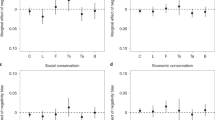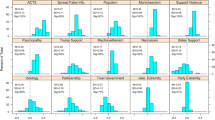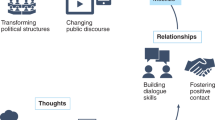Abstract
The dominant narrative among scholars and political pundits characterizes American partisanship as overwhelmingly negative, portraying citizens as more repelled by the opposing party than attached to their own party. To assess the valence of partisan identity, we use various measures collected from several new and existing nationally representative surveys and behavioural outcomes obtained from two experiments. Our findings consistently depart from the negative partisanship narrative. For the majority of Americans, partisanship is either equally positive and negative or more positive than negative. Only partisan leaners stand out as negative partisans. We pair these observational findings with experimental data that differentiate between positive group behaviour and negative group behaviour in the partisan context. We find that the behavioural manifestations of party identity similarly include both positive and negative biases in balance, reinforcing our conclusion that descriptions of partisanship as primarily negative are exaggerated.
This is a preview of subscription content, access via your institution
Access options
Access Nature and 54 other Nature Portfolio journals
Get Nature+, our best-value online-access subscription
$29.99 / 30 days
cancel any time
Subscribe to this journal
Receive 12 digital issues and online access to articles
$119.00 per year
only $9.92 per issue
Buy this article
- Purchase on Springer Link
- Instant access to full article PDF
Prices may be subject to local taxes which are calculated during checkout








Similar content being viewed by others
Data availability
Replication data and materials are available at the Open Science Framework, https://osf.io/cavxk/.
Code availability
Replication code can be found at https://osf.io/cavxk/.
References
Abramowitz, A. I. & Webster, S. W. ‘Negative partisanship’ explains everything. Politico https://www.politico.com/magazine/story/2017/09/05/negative-partisanship-explains-everything-215534/ (5 September 2017).
Abramowitz, A. I. & Webster, S. W. The rise of negative partisanship and the nationalization of U.S. elections in the 21st century. Elect. Stud. 41, 12–22 (2016).
Abramowitz, A. I. & Webster, S. W. Negative partisanship: why Americans dislike parties but behave like rabid partisans. Polit. Psychol. 39, 119–135 (2018).
Cassese, E. C. Dehumanization of the opposition in political campaigns. Soc. Sci. Q. 101, 107–120 (2020).
Cassese, E. C. Partisan dehumanization in American politics. Polit. Behav. 43, 29–50 (2021).
Iyengar, S. & Krupenkin, M. The strengthening of partisan affect. Polit. Psychol. 39, 201–218 (2018).
Kalmoe, N. & Mason, L. Radical American Partisanship: Mapping Extreme Hostility, Its Causes, and the Consequences for Democracy (Univ. of Chicago Press, 2022).
Kalmoe, N. P., Gubler, J. R. & Wood, D. A. Toward conflict or compromise? How violent metaphors polarize partisan issue attitudes. Polit. Commun. 35, 333–352 (2018).
Nicholson, S. P. Polarizing cues. Am. J. Polit. Sci. 56, 52–66 (2012).
Nicholson, S. P., Coe, C. M., Emory, J. & Song, A. V. The politics of beauty: the effects of partisan bias on physical attractiveness. Polit. Behav. 38, 883–898 (2016).
Mason, L. Uncivil Agreement: How Politics Became Our Identity (Univ. of Chicago Press, 2018).
Webster, S. W. American Rage (Cambridge Univ. Press, 2020).
Bankert, A. Negative and positive partisanship in the 2016 U.S. presidential elections. Polit. Behav. https://doi.org/10.1007/s11109-020-09599-1 (2020).
Iyengar, S., Sood, G. & Lelkes, Y. Affect, not ideology: a social identity perspective on polarization. Public Opin. Q. 76, 405–431 (2012).
Tajfel, H. & Turner, J. C. in The Social Psychology of Intergroup Relations (eds Austin, W. G. & Worchel, S.) 33–37 (Wadsworth, 1979).
Brewer, M. B. The psychology of prejudice: ingroup love or outgroup hate? J. Soc. Issues 55, 429–444 (1999).
Greenwald, A. G. & Pettigrew, T. F. With malice toward none and charity for some: ingroup favoritism enables discrimination. Am. Psychol. 69, 669–684 (2014).
Huber, G. A. & Malhotra, N. Political homophily in social relationships: evidence from online dating behavior. J. Polit. 79, 269–283 (2017).
Hewstone, M., Rubin, M. & Willis, H. Intergroup bias. Annu. Rev. Psychol. 53, 575–604 (2002).
Lelkes, Y. & Westwood, S. J. The limits of partisan prejudice. J. Polit. 79, 485–501 (2017).
McConnell, C., Margalit, Y., Malhotra, N. & Levendusky, M. The economic consequences of partisanship in a polarized era. Am. J. Polit. Sci. 62, 5–18 (2018).
Costa, M. Ideology, not affect: what Americans want from political representation. Am. J. Polit. Sci. 65, 342–358 (2021).
Druckman, J. N., Klar, S., Krupnikov, Y., Levendusky, M. & Ryan, J. B. (Mis-)estimating affective polarization. J. Polit. 84, 1106–1117 (2022).
Medeiros, M. & Noël, A. The forgotten side of partisanship: negative party identification in four Anglo-American democracies. Comp. Polit. Stud. 47, 1022–1046 (2014).
Tajfel, H. Social identity and intergroup behaviour. Soc. Sci. Inf. 13, 65–93 (1974).
Morgan, S. L. & Winship, C. Counterfactuals and Causal Inference (Cambridge Univ. Press, 2015).
West, E. A. & Iyengar, S. Partisanship as a social identity: implications for polarization. Polit. Behav. 44, 807–838 (2022).
Lelkes, Y. What do we mean by negative partisanship? Forum https://doi.org/10.1515/for-2021-2027 (2021).
Druckman, J. N. & Levendusky, M. S. What do we measure when we measure affective polarization? Public Opin. Q. 83, 114–122 (2019).
Zhong, C.-B., Phillips, K. W., Leonardelli, G. J. & Galinsky, A. D. Negational categorization and intergroup behavior. Pers. Soc. Psychol. Bull. 44, 1563–1566 (2008).
Greene, S. Understanding party identification: a social identity approach. Polit. Psychol. 20, 393–403 (1999).
Iyengar, S., Lelkes, Y., Levendusky, M. S., Malhotra, N. & Westwood, S. J. The origins and consequences of affective polarization in the United States. Annu. Rev. Polit. Sci. 22, 129–146 (2019).
Carlin, R. E. & Love, G. J. The politics of interpersonal trust and reciprocity: an experimental approach. Polit. Behav. 35, 43–63 (2013).
Iyengar, S. & Westwood, S. J. Fear and loathing across party lines: new evidence on group polarization. Am. J. Polit. Sci. 59, 690–707 (2015).
Westwood, S. J., Peterson, E. & Lelkes, Y. Are there still limits on partisan prejudice? Public Opin. Q. 83, 584–597 (2019).
Halevy, N., Bornstein, G. & Sagiv, L. “In-group love” and “out-group hate” as motives for individual participation in intergroup conflict: a new game paradigm. Psychol. Sci. 19, 405–411 (2008).
Weisel, O. & Böhm, R. “Ingroup love” and “outgroup hate” in intergroup conflict between natural groups. J. Exp. Soc. Psychol. 60, 110–120 (2015).
Halevy, N., Weisel, O. & Bornstein, G. “In-group love” and “out-group hate” in repeated interaction between groups. J. Behav. Decis. Mak. 25, 188–195 (2012).
Tappin, B. M. & McKay, R. T. Moral polarization and out-party hostility in the US political context. J. Soc. Polit. Psychol. 7, 213–245 (2019).
Cikara, M., Botvinick, M. M. & Fiske, S. T. Us versus them: social identity shapes neural responses to intergroup competition and harm. Psychol. Sci. 22, 306–313 (2011).
Cuddy, A. J. C., Fiske, S. T. & Glick, P. The BIAS map: Behaviors from Intergroup Affect and Stereotypes. J. Pers. Soc. Psychol. 92, 631–648 (2007).
Rudman, L. A. & Ashmore, R. D. Discrimination and the implicit association test. Group Process. Intergroup Relat. 10, 359–372 (2007).
Finkel, E. J. et al. Political sectarianism in America. Science 370, 533–536 (2020).
Klar, S. & Krupnikov, Y. Independent in America: Why People Avoid Partisanship and Why It Matters (Cambridge Univ. Press, 2016).
Klar, S., Krupnikov, Y. & Ryan, J. B. Affective polarization or partisan disdain? Untangling a dislike for the opposing party from a dislike of partisanship. Public Opin. Q. 82, 379–390 (2018).
Delkic, M. Voters choosing among ‘lesser of two evils,’ survey finds. ABC News https://abcnews.go.com/Politics/voters-choosing-lesser-evils-survey-finds/story?id=42460153 (29 September 2016).
Jordan, J. J. & Rand, D. G. Signaling when no one is watching: a reputation heuristics account of outrage and punishment in one-shot anonymous interactions. J. Pers. Soc. Psychol. 118, 57–88 (2020).
Mummendey, A. & Wenzel, M. Social discrimination and tolerance in intergroup relations: reactions to intergroup difference. Pers. Soc. Psychol. Rev. 3, 158–174 (1999).
Parker, M. T. & Janoff-Bulman, R. Lessons from morality-based social identity: the power of outgroup ‘hate,’ not just ingroup ‘love’. Soc. Justice Res. 26, 81–96 (2013).
Gidron, N., Adams, J. & Horne, W. American Affective Polarization in Comparative Perspective (Cambridge Univ. Press, 2020).
Benz, M. & Meier, S. Do people behave in experiments as in the field? Exp. Econ. 11, 268–281 (2008).
Galizzi, M. M. & Navarro-Martínez, D. On the external validity of social preference games: a systematic lab–field study. Manage. Sci. 65, 976–1002 (2018).
Alm, J., Bloomquist, K. M. & McKee, M. On the external validity of laboratory tax compliance experiments. Econ. Inq. 53, 1170–1186 (2015).
Groenendyk, E. Competing Motives in the Partisan Mind: How Loyalty and Responsiveness Shape Party Identification and Democracy (Oxford Univ. Press, 2013).
Levendusky, M. & Malhotra, N. Does media coverage of partisan polarization affect political attitudes? Polit. Commun. 33, 283–301 (2016).
Lees, J. & Cikara, M. Inaccurate group meta-perceptions drive negative out-group attributions in competitive contexts. Nat. Hum. Behav. 4, 279–286 (2020).
Moore-Berg, S. L., Ankori-Karlinsky, L.-O., Hameiri, B. & Bruneau, E. Exaggerated meta-perceptions predict intergroup hostility between American political partisans. Proc. Natl Acad. Sci. USA 117, 14864–14872 (2020).
Groenendyk, E., Sances, M. W. & Zhirkov, K. Intra party polarization in American politics. J. Polit. 82, 1616–1620 (2020).
Druckman, J. N., Gubitz, S., Lloyd, A. M. & Levendusky, M. S. How incivility on partisan media (de) polarizes the electorate. J. Polit. 81, 291–295 (2019).
R Core Team. R: A language and environment for statistical computing. R Foundation for Statistical Computing, Vienna, Austria. https://www.R-project.org/ (2020).
Acknowledgements
We thank A. Bankert, H. Brady, J. Druckman, P. Egan, A. Guess, S. Goggin, J. Henderson, K. Lane, M. Levendusky, B. Nosek, E. Schickler, J. Sekhon, N. Sriram and R. Van Houweling and participants in the Racial Attitudes in a Time of Growing Partisan Polarization Workshop at Princeton University for feedback. This research was funded by the University of California, Merced; the University of Pennsylvania; and the Vanderbilt University Center for the Study of Democratic Institutions, and was supported by National Science Foundation award nos 1559125 and 1756447. We also thank Project Implicit and the Vanderbilt Research on Individuals, Politics and Society Lab. The funders had no role in study design, data collection and analysis, decision to publish or preparation of the manuscript.
Author information
Authors and Affiliations
Contributions
A.H.-Y.L., Y.L., C.B.H. and A.G.T. designed the studies, conducted the analyses, and drafted and revised the manuscript.
Corresponding author
Ethics declarations
Competing interests
The authors declare no competing interests.
Peer review
Peer review information
Nature Human Behaviour thanks Elizabeth Simas and the other, anonymous, reviewer(s) for their contribution to the peer review of this work. Peer reviewer reports are available.
Additional information
Publisher’s note Springer Nature remains neutral with regard to jurisdictional claims in published maps and institutional affiliations.
Supplementary information
Supplementary Information
Supplementary Figs. 1–8, Tables 1–7 and discussion of implicit data.
Rights and permissions
About this article
Cite this article
Lee, A.HY., Lelkes, Y., Hawkins, C.B. et al. Negative partisanship is not more prevalent than positive partisanship. Nat Hum Behav 6, 951–963 (2022). https://doi.org/10.1038/s41562-022-01348-0
Received:
Accepted:
Published:
Issue Date:
DOI: https://doi.org/10.1038/s41562-022-01348-0
This article is cited by
-
What one is not: a new scale to measure Negative Party Identity in multiparty systems
Quality & Quantity (2024)
-
Why voters who value democracy participate in democratic backsliding
Nature Human Behaviour (2023)
-
Multidimensional partisanship shapes climate policy support and behaviours
Nature Climate Change (2023)
-
Partisanship on Social Media: In-Party Love Among American Politicians, Greater Engagement with Out-Party Hate Among Ordinary Users
Political Behavior (2023)



